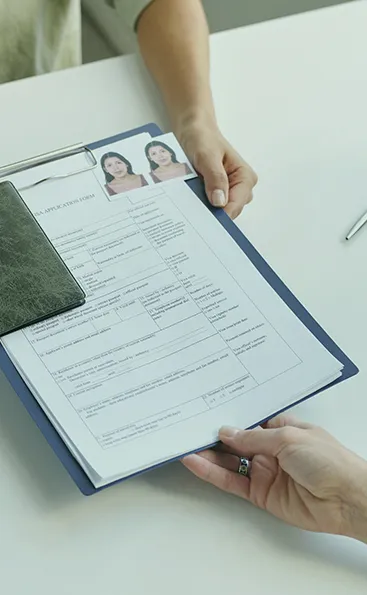MON – FRI (8am - 6pm)
The Violence Against Women Act (VAWA), enacted in 1994, provides immigration relief to individuals who have experienced domestic abuse. It enables non-citizen victims of domestic violence, through vawa requirements, who are related to U.S. citizens or lawful permanent residents, to self-petition for lawful immigration status without their abuser's knowledge.
This protection extends to abused spouses, children, and parents. VAWA is a critical resource for victims who fear deportation or losing their immigration status because of the control exercised by their abuser. Contact Serving Immigrants for dedicated legal assistance in VAWA.


VAWA is designed to protect spouses, children, and parents who meet the VAWA requirements for abuse from a U.S. citizen or lawful permanent resident.
Spouses who have been physically or emotionally abused can file a VAWA petition, as well as children under the age of 21 who are unmarried.
Parents of U.S. citizens, aged 21 or older, are also eligible if they meet the VAWA requirements and have suffered abuse. Even individuals who are no longer married to their abusive spouse can still file, as long as the marriage was terminated within the last two years due to abuse-related reasons.
For VAWA petitions filed by abused spouses, a person can meet the VAWA requirements by proving that the marriage was entered into in good faith. Demonstrating a good faith marriage involves providing evidence such as photos, joint financial documents, or affidavits from friends and family.
To meet the VAWA requirements for a good faith marriage, petitioners must submit documentation that shows the relationship was genuine. This may include joint bank accounts, tax returns, insurance policies, or other shared financial commitments.
Even if the petitioner is no longer married to their abuser, they can still meet the VAWA requirements as long as they can prove that the marriage was entered into in good faith and ended due to abuse.

In VAWA, multiple types of abuse are recognized. Below, we provide a brief yet comprehensive description of each.
VAWA recognizes a broad range of abusive behaviors, including physical violence, threats, and emotional or psychological abuse. Physical abuse can include hitting, pushing, or any form of violent behavior.
Emotional abuse often involves intimidation, isolation, or manipulation tactics used by the abuser to exert control over the victim. Meeting the VAWA requirements does not necessitate experiencing physical harm, as victims of emotional and psychological abuse are equally eligible. Looking for legal help? Serving Immigrants is here to assist you.
Extreme cruelty refers to non-physical forms of abuse, which are covered under VAWA requirements. This may include threats, harassment, financial control, and verbal assaults.
Behaviors intended to degrade or demean the victim, such as controlling access to finances or isolating the victim from friends and family.

VAWA recognizes different methods for proving abuse. Below is a brief yet detailed overview of the types of evidence you should provide, and the challenges you may encounter.
Proving abuse is one of the central VAWA requirements. Petitioners must submit evidence such as police reports, medical records, or affidavits from witnesses.
If official documentation is unavailable, petitioners can submit personal affidavits or statements from friends, family, or professionals who have witnessed the abuse.
Meeting the VAWA requirements for proving abuse can be difficult, especially if the abuser has hidden important documents. Petitioners can use alternative forms of evidence, such as personal affidavits or therapist reports.
The key is to provide as much detailed documentation as possible, as fulfilling the VAWA requirements for evidence will significantly strengthen the petition.

Form I-360 is the petition used by victims to meet the VAWA requirements and self-petition for immigration relief. By filing this form, victims can apply for a special immigrant classification without their abuser’s consent. See how form I-360 looks.
The form requires detailed information about the relationship with the abuser and evidence of abuse, cohabitation, and good moral character. It is crucial to gather the necessary documentation to ensure the petition’s success.
Gathering all the required documentation is vital when applying for VAWA. Failing to meet the VAWA requirements can delay the processing time for your case. This section provides further details on the necessary documentation.
A personal affidavit, which is an optional requirement, is a written statement where you detail your relationship with the abuser, the abuse you experienced, and its impact on your life. It gives USCIS a detailed understanding of your situation in your own words. Your affidavit should be thorough, outlining how you meet the VAWA requirements, and include any relevant details or specific incidents of abuse.
If you have photographs showing injuries or damaged property resulting from the abuse, these can be powerful pieces of evidence. Physical evidence like this helps substantiate claims of abuse and is a direct way to meet VAWA requirements.
Medical records can be submitted to document injuries caused by the abuser. These records can include doctor’s notes, hospital reports, or psychiatric evaluations that verify the physical or emotional harm you experienced. Medical documentation is especially useful in cases where there may not be police involvement but where the effects of the abuse are well-documented.
If law enforcement was involved during the abusive incidents, police reports can be critical in meeting the VAWA requirements. Additionally, if you obtained a protection or restraining order against your abuser, this document can serve as evidence that you sought help to escape the abuse, further supporting your claim.
Statements from friends, family members, or community figures who are aware of the abuse can provide strong support for your petition. These affidavits should detail how the person came to know about the abuse and any specific incidents they witnessed. This evidence helps corroborate your story and reinforces your VAWA case.
In cases where a divorce or legal separation occurred due to the abuse, court documents can be submitted to meet VAWA requirements. These documents can include divorce decrees, custody agreements, or any legal filings that mention the abusive behavior. They help establish a clear timeline of the relationship and the impact of the abuse.
One of the VAWA requirements is that petitioners must have lived with their abuser at some point during the relationship. The VAWA requirements for residency do not stipulate a specific length of time, but evidence of cohabitation, such as lease agreements or shared bills, is necessary.
Fulfilling the requirements ensures that the petitioner was in a genuine, cohabiting relationship with the abuser. Discover more ofGreen Card for VAWA Self-Petitioner, click here.
While most VAWA applicants must reside in the U.S. when filing, exceptions exist for those whose abusers work for the U.S. government or military abroad. VAWA requirements allow for the possibility of filing from overseas under specific circumstances.
Additionally, victims who were abused while in the U.S. but are currently abroad may still qualify if they can prove the abuse occurred during their time in the country, meeting the VAWA requirements for residency.


In addition to proof of abuse, VAWA requirements include submitting evidence of the petitioner’s relationship with the abuser.
This can include marriage certificates, joint financial records, or birth certificates for children. Meeting these VAWA requirements is essential for USCIS to evaluate the petition fully.
Petitioners should aim to gather all relevant documentation to ensure they meet the VAWA requirements for a successful petition.
VAWA petitioners must demonstrate good moral character to meet the VAWA requirements for immigration benefits. This involves proving that they have not been involved in serious criminal activities. Petitioners can meet the VAWA requirements by providing police clearance certificates, affidavits from community leaders, or records of volunteer work. Having an expert VAWA attorney is essential for guidance throughout the process.
This FAQ section provides additional insights to complement the information in the article and addresses common questions related to VAWA requirements.
These are the requirements that, if met, allow a person to eventually obtain a green card. To do so, individuals must have a relationship with a U.S. citizen or permanent resident, prove they suffered abuse, and show they lived with the abuser. They must also demonstrate good moral character and, if married, prove the marriage was genuine. These steps enable victims to self-petition for immigration relief.
VAWA (Violence Against Women Act) allows abused spouses, children, and parents of U.S. citizens or lawful permanent residents (LPRs) to self-petition for immigration relief.
Both physical abuse and extreme cruelty, including emotional, psychological, and financial abuse, qualify under VAWA.
If your petition is denied, you may appeal the decision or reapply with additional evidence. Seeking legal assistance can also improve your chances of success. If you want to read more questions and answers about VAWA enter here.